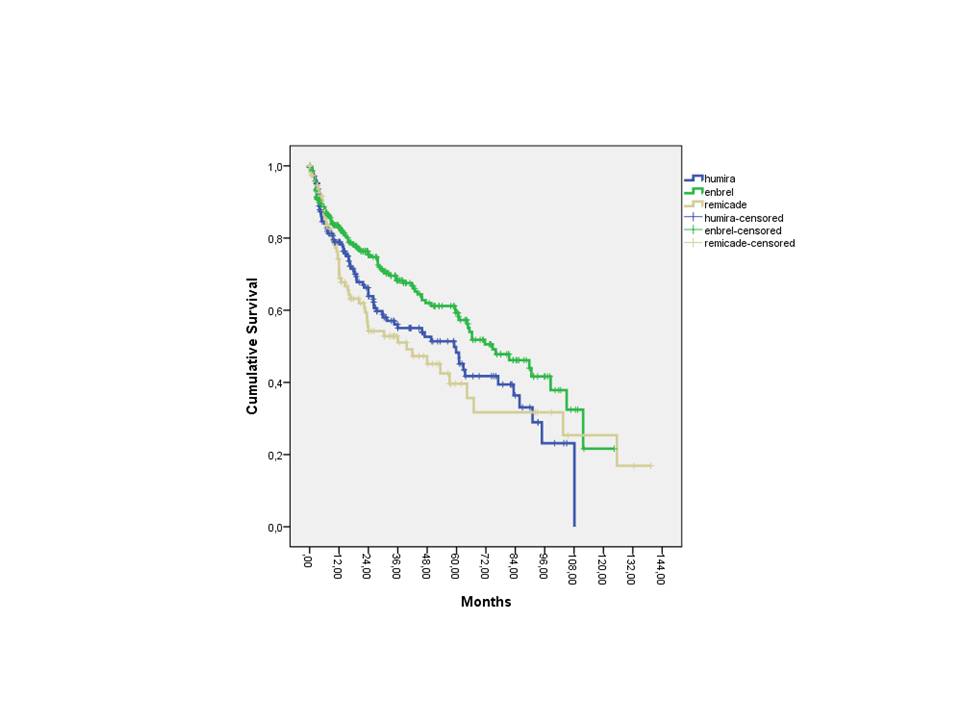Session Information
Session Type: Abstract Submissions (ACR)
Etanercept have better drug survival than monoclonal antibodies in Rheumatoid Arthritis: Results of single center HÜR-BÝO registry
Background/Purpose: In routine practice, observational registries may show retention rates of TNFi drugs in rheumatoid arthritis (RA). The objective of this study was to compare TNF inhibitors regarding the drug survival rate in RA patients.
Methods : HÜR-BIO (Hacettepe University Rheumatology Biologic Registry) is a single center biological registry since 2005. Data collected includes demographic data, switch ratio, baseline and follow–up disease activity parameters (if available). Patients with regularly follow–up status were recorded systematically. Patients with lost of follow–up searched regarding to last TNFi prescription date either local computer system or national social security institution database. Inition and last date of TNFi were noted from those systems. First TNFi drug switch date (either advers event or inefficacy) was accepted as main variable for drug survival. Kaplan-Meier plots and log rank tests were used to assess drug survival. HÜR-BIO is not sponsored by any pharmaceutical company.
Results: HÜR-BIO includes 815 RA patients, however 156 of 815 patients excluded because of other biological agents such as rituksimab, abatecept and golimumab. Of 659 patients 77,7% was female. Mean age was 50±13 years and mean disease duration was 11±8 years. TNFi drug duration was 3,2±2,8 years and 176 (26,7%) patients were used TNFÝ drugs more than 5 years. Positive ACPA and RF were 216/356 (60,6%) and 353/601 (58,7%), respectively. First TNFi drugs were etanercept 321 (48,7%), adalimumab 223 (33,8%) and infliximab 115 (17,5%). TNFi switch was found in 246 (37,3%) patients. Patients were divided as regularly follow–up (either first biological drugs or another biological drugs) 487 (73,9%), lost of follow–up 114 ( 17,3%), drug cessation 35 (5,3%), exitus 15 (2,3%) and not first control performed 8 (1,2%). Patients with etanercept had better drug retention than monoclonal antibodies (log rank p=0.014), figure 1.
Conclusion : In this single center observational registry, etanercept had better drug retention rate than monoclonal antibodies. Our result is similar with another registry such as DANBIO (1). On the other hand, certain confounder factors such as baseline disease activity, functional status, socioeconomic status were not known in whole patients, thus our results should evaluate in this limitation.
Reference: 1. Arthritis Rheumatism 2010;62:22-32.
Disclosure:
U. Kalyoncu,
None;
M. Torgutalp,
None;
H. Babaoglu,
None;
S. Kilickap,
None;
S. Kiraz,
None;
A. Akdogan,
None;
O. Karadag,
None;
A. Erden,
None;
S. Apras Bilgen,
None;
I. Ertenli,
None.
« Back to 2014 ACR/ARHP Annual Meeting
ACR Meeting Abstracts - https://acrabstracts.org/abstract/etanercept-have-better-drug-survival-than-monoclonal-antibodies-in-rheumatoid-arthritis-results-of-single-center-hur-bio-registry/

